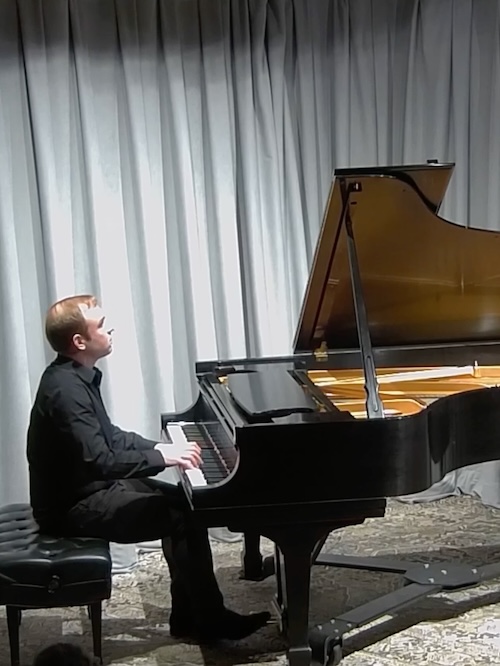Pianist Crosett serves up an absorbing program of genre-crossing music
A hundred years ago last month, George Gershwin’s Rhapsody in Blue offered one of the first convincing proofs that classical music and jazz could play well together. On Thursday night, pianist Alexander Crosett’s recital at Somerville Music Spaces delivered a timely follow-up to that proof.
Crosett’s recital, which was presented with support from Boston Classical Review founder Lawrence A. Johnson’s American Music Project, expanded on Gershwin’s parameters and included works that fused elements of the blues, folk music, musical theater, techno, and other genres with classical forms and structures. The results were altogether absorbing.
Anchoring the night was Fred Hersch’s 24 Variations on a Bach Chorale. Written in response to the 9/11 attacks, this 25-minute-long score takes the familiar chorale from the St. Matthew Passion (“O Haupt voll Blut und Wunde”) and subjects it to a series of concise, sometimes unexpectedly playful, transformations.
Though he has made his name as a jazz pianist, Hersch’s Variations don’t lean that heavily into stereotypical jazz textures or progressions. In fact, there’s probably more Schumann and Chopin undergirding his writing than anything else.
On Thursday, Crosett mined the Variations’ neo-Romantic moments for all they were worth. The twelfth and seventeenth sections, with their graceful phrasings and limpid chromaticism, sang beautifully. So did the Chopin-worthy waltz that is No. 21.
Nor was there any shortage of knowing humor. The refracted octave displacements in the opening pair of variations sparkled, as did the droll gestures in No. 20. Likewise, Hersch’s apparent sendup of the “Pianistes” movement from Saint-Saëns’ Carnival of the Animals (No. 15) exuded martini-dry wit.
On occasion one might wish for more Rzewskian depth to this music. A few of its variations (like the turbulent fifth and stormy eighteenth) border on trite, and the cascading scales over its closing set offer little more than sprays of color. Yet Crosett’s reading, with its careful shadings of color, rhythmic precision, and resounding sense of character, largely quieted such concerns.
There were no evident weaknesses in the night’s remaining selections.
Betty Jackson King’s Four Seasonal Sketches, for one, was a revelation. Written in 1973, this tetralogy veers from a warm, flowing “Spring Intermezzo” to a wistful “Summer Interlude,” wedge-like “Autumn Dance” and bold “Winter Holiday.” Crosett’s reading, smartly voiced and evincing a huge dynamic range, was captivating.
Similarly invigorating was the pianist’s take on Samuel Barber’s Excursions. Possibly the last major 20th-century American composer from whom one would expect an affinity for either black or vernacular musical forms, his 1945 effort convincingly channels both the blues and cowboy songs.
In Crosett’s hands, Excursions’ peppery dissonances spoke bitingly, especially those in the soulfully abstracted second movement and the spunky, vigorous finale. At the same time, the third-movement arrangement of “Streets of Laredo” charmed.
So did Karen Tanaka’s Techno Etudes II. Marked by pungent harmonic progressions and slashing rhythms in its outer movements and hypnotic, tolling gestures in the middle one, the score stands as a refreshing update of an old genre.
Among other things, it’s marvelously fluent with its points of reference, ranging from dance clubs and trance music to the Korean boy band BTS. Crosett ensured that those allusions emerged readily and that the Etudes’ dense, often low-register textures projected cleanly.
He was also persuasive in Mary Ellen Childs’ Stephen Sondheim arrangement, Now, and Gabriela Lena Frank’s Barcarola Latinoamericana, with its acidic allusions to Chopin and seeming echoes of Porgy and Bess.
Easy tunefulness and snazzy syncopations provided Dana Suesse’s Serenade to a Skyscraper the clearest connections of the night to Gershwin’s legacy. Yet the short score was hardly derivative and sweetly charted its own course.
As with the rest of the night’s offerings, Crosett imbued this music with a sense of discovery that was as touching as it was fully deserved. Those not in the house in Somerville can hear the same program on the pianist’s new Centaur recording, which will be released March 8.
Posted in Performances
